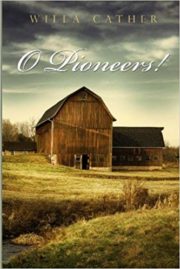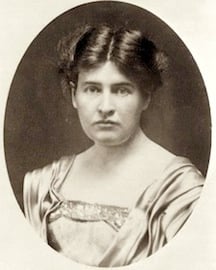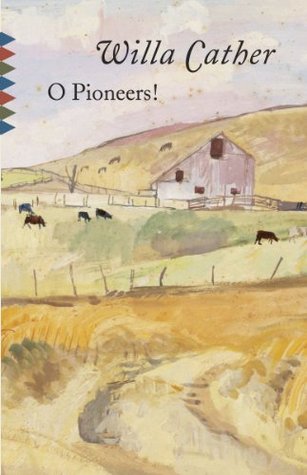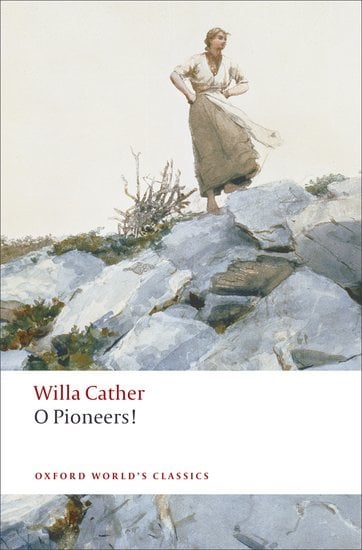O Pioneers! by Willa Cather (1913)
By Taylor Jasmine | On November 4, 2018 | Updated May 22, 2019 | Comments (0)

O Pioneers! by Willa Cather is one of this esteemed American author’s most iconic novels. One of her earliest full-length works, it was published in 1913.
Written in the kind of spare, lyric prose that would come to define her work, the story explores themes of destiny, chance, love, and perseverance.
It explores the ideas of community, family ties, and the dignity of work. Never sentimental or verbose, Cather delivers her plots with gentle forward motion. Her characters may be flawed, but they’re rarely weak.
Putting the daughter in charge
The novel’s central character, Alexandra Bergson, is her parents’ only daughter and oldest child. The Bergsons are Swedish immigrants working the Nebraska prairie land. The Bergsons encounter hardship, naturally. The unforgiving land is difficult to farm, the climate is harsh, and their neighbors, an amalgam of European immigrants, don’t always live harmoniously.
When Alexandra’s father John dies, he conveys his desire clearly to his offspring —Alexandra is to run the farm, and her brothers are to follow her lead. They are all to take care of their mother. His final instructions are conveyed from the deathbed:
“Boys,” said the father wearily, “I want you to keep the land together and to be guided by your sister. I have talked to her since I have been sick, and she knows all my wishes. I want no quarrels among my children, and so long as there is one hose there must be one head. Alexandra is the oldest, and she knows my wishes …”
If she makes mistakes, she will not make so many as I have made. When you marry, and want a house of your own, the land will be divided fairly, according to the courts. But for the next few years you will have it hard, and you must all keep together. Alexandra will manage the best she can.”
It’s difficult to know whether this action of John Bergson reflected anything of real life in those times — remember, this was published in 1913. It seems that a father putting his daughter in charge of the land he did battle with yet loved, when there are a number of sons as well, is quite a feminist statement.
. . . . . . . . . .
Quotes from O Pioneers! by Willa Cather
. . . . . . . . . .
Success comes with sacrifice
Alexandra did more than just manage. She proved her mettle at managing the business of farming and household management to become one of the most prosperous landowners in the region.
This success came with the sacrifice; Alexandra had to forgo the joys of youth and young adulthood. And human nature being what it is, the enterprise wasn’t without conflict with her brothers.
It is the youngest brother, Emil who gets to set foot in the wider world and pursue a college education. Though this is due to the fruits of his family’s hard work, his brothers resent him for it and grow to hate Alexandra for creating such a seismic shift in the family dynamic.
Emil’s story, told alongside Alexandra’s, is central to the plot and involves his love interest, Marie, a married woman from the town’s French community.
As in all of Cather’s prairie novels and stories, the land itself becomes a character of sorts, a symbol of a way of life that tested the endurance of the pioneers who lived it.
More than one hundred years after its publication, O Pioneers! still resonates, speaking to the virtues of dignity, hard work, sacrifice, and loyalty. It’s only right and fitting that Alexandra Bergson, a feminist heroine for the ages, finds a way to happiness and contentment in the end.
. . . . . . . . . .

Willa Cather on the Art of Fiction
. . . . . . . . . .
A 1913 Review of O Pioneers!
A Novel Without A Hero: O Pioneers! by Willa Cather from the original review in the New York Times, September, 1913: The hero of the American novel very often starts on the farm, but he seldom stays there; instead he uses it as a spring-board form which to plunge into the mysteries of politics or finance.
Probably the novel reflects a national tendency. To be sure, after we have carefully separated ourselves from the soil, we are apt to talk a lot about the advantages of a return to it, but in most cases it ends there. The average American does not have any deep instinct for the land, or vital consciousness of the dignity and value of the life that may be lived upon it.
The struggle with the untamed land
O Pioneers! is filled with this instinct and this consciousness. It is a tale of the old wood-and-field worshipping races, Swedes and Bohemians, transplanted to Nebraskan uplands, of their struggle with the untamed soil, and their final conquest of it. Miss Cather has written a good story, we hasten to assure the reader who cares for good stories, but she has achieved something finer.
Through a direct, human tale of love and struggle and attainment, a tale that is American in the best sense of the word, there runs a thread of symbolism. It is practically a novel without a hero. There are men in it, but the interest centers in two women — not rivals, but friends, and more especially in the splendid farm-woman, Alexandra.
. . . . . . . . . .

O Pioneers! by Willa Catheron Amazon
. . . . . . . . . .
The great feminine
In this new mythology, which is the old, the goddess of fertility once more subdues the barren and stubborn earth. Possibly some might call it a feminist novel, for the who heroines are stronger, cleverer, and better balanced than their husbands and brothers — but we are sure Miss Cather had nothing so inartistic in mind.
It is a natural growth, feminine because it is only an expansion of the very essence of femininity.
Instead of calling O Pioneers! a novel without a hero it might be more accurate to call it a novel with three heroines — Alexandra, the harvest-goddess, Marie, poor little spirit of love and youth snatched untimely former poppy-fields, and the Earth itself, patient and bountiful source of all things.
. . . . . . . . . . .
*This post contains affiliate links. If the product is purchased by linking through, Literary Ladies Guide receives a modest commission, which helps maintain our site and helps it to continue growing!

Leave a Reply